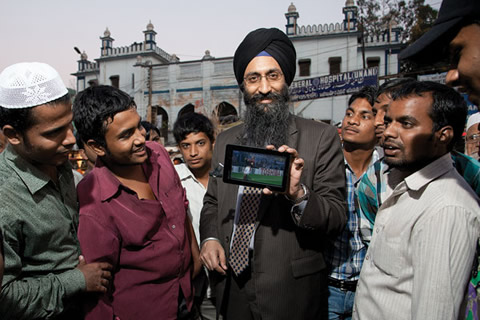When Apple famously unveiled the iPad in January 2010, the late CEO Steve Jobs proclaimed it “a magical and revolutionary device at an unbelievable price” at US$499. U of T engineering grad Suneet Singh Tuli hopes to bring the same brand of magic to the developing world – offering a tablet computer at an even lower price tag. How low? Try 50 bucks.
“The whole intent is to make Internet access affordable enough for the next tier of customers,” says Tuli, who founded the company Datawind with his brother, Raja. Currently, about two billion people worldwide enjoy Internet access; but another four billion use low-cost mobile phones without Internet access. “We believe that four-billion-person market is ready to be tapped,” says Tuli (BASc 1990). As of late February, Datawind had launched a pilot model and delivered 10,000 tablets to the Government of India. They will vie with other companies for a contract to build an additional 1 million tablets.
Building a touch-screen Internet tablet computer for peanuts involves, to say the least, some serious engineering hurdles. “A lot of the challenge was the decision-making process,” says Tuli – deciding what absolutely had to be included, and what was expendable. As a result, features that North Americans take for granted, such as Bluetooth, are out. The UbiSlate’s touch field is not as sensitive as one in a new North American tablet, its processor is slower and its battery life is shorter. However, a slot accepting USB flash drives – a cheap and low-tech way to share files, already common amongst target users – is included. Test users have noted the drawbacks, which has led to governmental concerns – and a request for other companies to get involved.
The hardware wasn’t Datawind’s only hurdle. “How do you deliver the Internet on the kind of networks that exist in the developing world?” says Tuli. The company developed compression software that delivers the web over low-bandwidth networks built for mobile phones. (And yes, it’s patented.)
Ubislate’s potential to provide a window on the world for people living in rural areas of the developing world is not lost on Tuli. The experience of immigrating from Punjab, India, to Tehran, Iran, in 1976 and then to Edmonton in 1979 gave the Tuli brothers a global perspective that informs their business today. “There weren’t many Sikhs around at the time,” Tuli says of both Tehran and Edmonton, “so it was a great learning experience both ways . . . Having lived in different parts of the world, you carry a unique appreciation for how broad it is.”
No one knows exactly what the effects of connecting a few billion more people in the developing world to the Internet will be: “We’ve already seen the value of Twitter and Facebook on something like the Arab Spring,” says Tuli. “We think that the web offers a level of empowerment that wasn’t imagined before.”
Recent Posts
For Greener Buildings, We Need to Rethink How We Construct Them
To meet its pledge to be carbon neutral by 2050, Canada needs to cut emissions from the construction industry. Architecture prof Kelly Doran has ideas
U of T’s 197th Birthday Quiz
Test your knowledge of all things U of T in honour of the university’s 197th anniversary on March 15!
Are Cold Plunges Good for You?
Research suggests they are, in three ways





